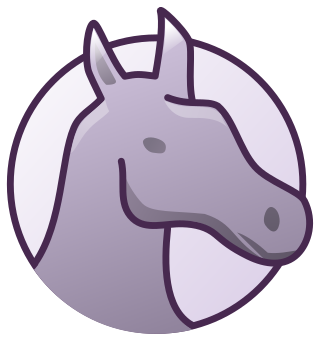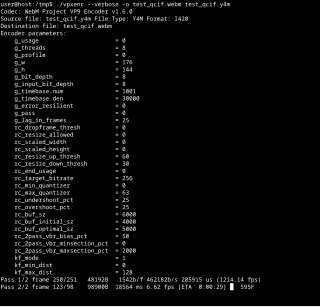Theora is a free lossy video compression format. It was developed by the Xiph.Org Foundation and distributed without licensing fees alongside their other free and open media projects, including the Vorbis audio format and the Ogg container.

Mozilla Thunderbird is a free and open-source email client that also functions as a personal information manager with a calendar and contactbook, as well as an RSS feed reader, chat client (IRC/XMPP/Matrix), and news client. Operated by MZLA Technologies Corporation, a subsidiary of the Mozilla Foundation, Thunderbird is an independent, community-driven project that is managed and overseen by the Thunderbird Council, which is elected by the Thunderbird community. As a cross-platform application, Thunderbird is available for Windows, macOS, FreeBSD, Android, and Linux. The project strategy was originally modeled after that of Mozilla's Firefox, and Thunderbird is an interface built on top of that Web browser.

Anjuta was an integrated development environment written for the GNOME project. It had support for C, C++, Java, JavaScript, Python and Vala programming language. In May 2022, the project was archived due to a lack of maintainers. Since October 2022 the project's former homepage no longer exists and the domain is owned by an SBOBET, an Indonesian gambling website. It has been superseded by GNOME Builder.

Balsa is a lightweight email client written in C for the GNOME desktop environment.

Seahorse is a GNOME front-end application for managing passwords, PGP and SSH keys. Seahorse integrates with a number of apps including Nautilus file manager, Epiphany browser and Evolution e-mail suite. It has HKP and LDAP key server support.

OpenEmbedded (OE) is a build automation framework and cross-compile environment used to create Linux distributions for embedded devices. The framework is developed by the OpenEmbedded community, which was formally established in 2003. OpenEmbedded is the recommended build system of the Yocto Project, which is a Linux Foundation workgroup that assists commercial companies in the development of Linux-based systems for embedded products.

Miro is an audio, video player and Internet television application developed by the Participatory Culture Foundation. It runs on Microsoft Windows, macOS, FreeBSD and Linux and supports most known video file formats. It offers both audio and video, some in HD quality.
The Southern California Linux Expo (SCALE) is an annual Linux, open source and free software conference held in Los Angeles, California, since 2002. Despite having Linux in its name, SCALE covers all open source operating systems and software. It is a volunteer-run event.
Linux-based operating systems can be used for playing video games. Because few games natively support the Linux kernel, various software has been made to run Windows games, software, and programs, such as Wine, Cedega, DXVK, and Proton, and managers such as Lutris and PlayOnLinux. The Linux gaming community has a presence on the internet with users who attempt to run games that are not officially supported on Linux.
WebM is an audiovisual media file format. It is primarily intended to offer a royalty-free alternative to use in the HTML video and the HTML audio elements. It has a sister project, WebP, for images. The development of the format is sponsored by Google, and the corresponding software is distributed under a BSD license.

libvpx is a free software video codec library from Google and the Alliance for Open Media (AOMedia). It serves as the reference software implementation for the VP8 and VP9 video coding formats, and for AV1 a special fork named libaom that was stripped of backwards compatibility.

The Open Source Business Alliance - Bundesverband für digitale Souveränität e.V. (OSBA) is a German non-profit that operates Europe's biggest network of companies and organizations developing, building and using open source software.
Intel Quick Sync Video is Intel's brand for its dedicated video encoding and decoding hardware core. Quick Sync was introduced with the Sandy Bridge CPU microarchitecture on 9 January 2011 and has been found on the die of Intel CPUs ever since.

MATE is a desktop environment composed of free and open-source software that runs on Linux, and other Unix-like operating systems such as BSD, and illumos.
Mapbox is an American provider of custom online maps for websites and applications such as Foursquare, Lonely Planet, the Financial Times, The Weather Channel, Instacart, and Strava. Since 2010, it has rapidly expanded the niche of custom maps, as a response to the limited choice offered by map providers such as Google Maps.

Mailvelope is free software for end-to-end encryption of email traffic inside of a web browser that integrates itself into existing webmail applications. It can be used to encrypt and sign electronic messages, including attached files, without the use of a separate, native email client using the OpenPGP standard.
WireGuard is a communication protocol and free and open-source software that implements encrypted virtual private networks (VPNs). It aims to be lighter and better performing than IPsec and OpenVPN, two common tunneling protocols. The WireGuard protocol passes traffic over UDP.
The OpenJS Foundation is an organization that was founded in 2019 from a merger of JS Foundation and Node.js Foundation. OpenJS promotes the JavaScript and web ecosystem by hosting projects and funds activities that benefit the ecosystem. The OpenJS Foundation is made up of 38 open source JavaScript projects including Appium, Dojo, jQuery, Node.js, Node-RED and webpack. Founding members included Google, Microsoft, IBM, PayPal, GoDaddy, and Joyent.






